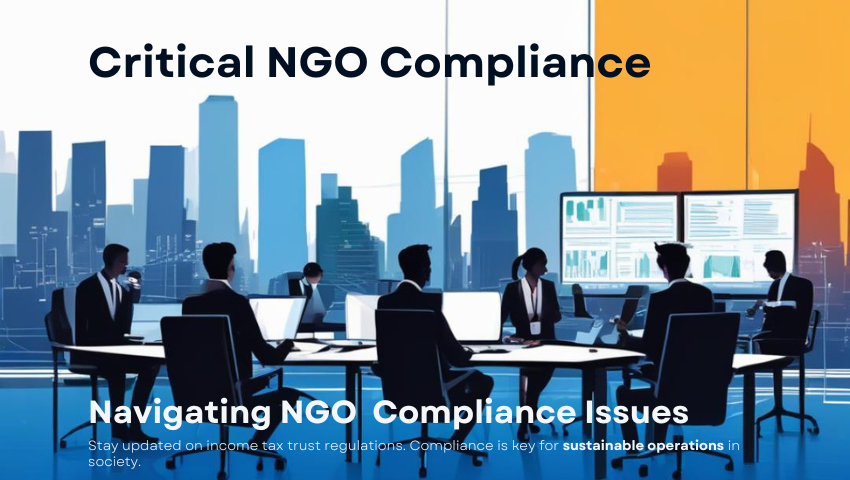
Critical NGO Compliance
Learn how NGOs can maintain tax-exempt status under Section 11(5) of the Income Tax Act, 1961. Discover approved investment options, compliance requirements, and consequences of non-compliance. Ensure your NGO maximizes financial security while adhering to legal standards. Stay tax-compliant and safeguard your charitable mission with expert insights on Section 11(5) investments.
Investment Compliance for NGOs Under Section 11(5) of the Income Tax Act, 1961
Introduction
Non-Governmental Organizations (NGOs) and charitable trusts registered under Section 12A of the Income Tax Act, 1961, enjoy tax exemptions on their income, provided they comply with certain conditions. One critical requirement is the application and investment of funds in prescribed modes under Section 11(5).
This article provides a detailed guide on:
- When NGOs need to invest under Section 11(5)
- Approved investment options
- Compliance requirements and reporting
- Consequences of non-compliance
- FAQs for clarity
Why Do NGOs Need to Invest Under Section 11(5)?
NGOs are required to apply at least 85% of their income towards charitable or religious activities every financial year. If they fail to do so, the remaining funds must either:
- Be accumulated for future use (Section 11(2)), or
- Be invested in prescribed investment options under Section 11(5) to retain tax exemption.
Situations where NGOs need to invest under Section 11(5)
- Accumulation of Income (Section 11(2)) – If an NGO doesn’t spend 85% of its income, it can accumulate the balance for up to 5 years but must invest it in approved modes.
- Corpus Donations – Corpus funds (permanent endowment) should ideally be parked in permitted investments.
- Surplus Funds Not Immediately Utilized – If the NGO receives a large donation or grant and cannot utilize it immediately, the funds should be invested in safe, compliant options.
Approved Investment Options Under Section 11(5)
- To ensure tax-exempt status, NGOs can only invest in the following approved instruments:
Investment Mode | Relevant Section/Rule | Notes |
|---|---|---|
Fixed Deposits (FDs) in Scheduled Banks | Section 11(5)(iii) | Must be placed with an RBI-listed Scheduled Bank. Cooperative banks (unless scheduled) are not allowed. |
Post Office Savings Deposits | Section 11(5)(iii) | Includes Post Office Time Deposits (POTD) and National Savings Certificates (NSC). |
Government Securities | Section 11(5)(ii) | Investment in Central or State Government bonds is allowed. |
Public Sector Bonds | Section 11(5)(vii) | Bonds issued by Public Sector Companies engaged in infrastructure projects. |
Units of UTI (Unit Trust of India) | Section 11(5)(i) | Investment in UTI mutual funds is permitted. |
Approved Mutual Funds (Section 10(23D)) | Section 11(5)(xii) | Investment in mutual funds notified by the Central Government. |
Deposits in Financial Institutions | Section 11(5)(ix) | Deposits in IFCI, SIDBI, NABARD, and other government-specified institutions. |
Real Estate (Land & Property for Charitable Purposes) | Section 11(5)(x) | NGOs can invest in immovable property, provided it is used for charitable objectives. |
Not Allowed:
- Fixed Deposits in cooperative banks (unless scheduled)
- Investment in shares or equities of private companies
- Investment in non-banking financial companies (NBFCs)
Compliance Requirements for NGOs Investing Under Section 11(5)
- To ensure full compliance, NGOs must:
- Pass a resolution for accumulation under Section 11(2) if applicable.
- File Form 10 before the due date of ITR-7 (Income Tax Return for Charitable Trusts).
- Invest the accumulated income in permitted investments within six months from the end of the financial year.
- Disclose investment details in ITR-7 to avoid taxation.
- Ensure proper documentation and board approval for investment decisions.
What Happens If an NGO Fails to Invest Under Section 11(5)?
If an NGO fails to invest in permitted instruments or invests in non-compliant options, it may face the following consequences:
- Loss of Tax Exemption – The unapplied portion of income becomes taxable at the maximum marginal rate (MMR) of 42.74%.
- Interest & Penalties – The NGO may have to pay interest under Sections 234B & 234C for shortfall in advance tax payments.
- Risk of Losing 12A/80G Registration – Repeated non-compliance could lead to the cancellation of tax-exempt status.
FAQs on Investments Under Section 11(5)
Q1: Can an NGO invest in Fixed Deposits (FDs) and still be compliant?
Yes, but only with Scheduled Banks or the Post Office. FDs in cooperative banks (unless scheduled) or private companies are not allowed.
Q2: What if an NGO receives a large donation and cannot spend it immediately?
The NGO should invest the surplus in approved options under Section 11(5) to avoid taxation.
Q3: Are mutual fund investments allowed?
Yes, but only in mutual funds notified under Section 10(23D) (e.g., government-approved mutual funds).
Q4: Can an NGO buy land or property with an accumulated income?
Yes, but only if the land or property is used for charitable purposes (e.g., schools, hospitals, shelter homes).
Q5: What happens if an NGO fails to invest as per Section 11(5)?
The unapplied or misinvested amount is taxed at 42.74% (MMR), and repeated non-compliance may result in the cancellation of the 12A/80G registration.
Conclusion
Investing under Section 11(5) is a crucial compliance requirement for NGOs. Choosing the right investment options helps in:
- Ensuring tax-exempt status
- Maximizing financial security for future charitable projects
- Avoiding penalties and tax liabilities
NGOs must ensure they follow proper documentation, timely filing (Form 10), and invest only in permitted instruments to stay compliant with Income Tax regulations.

Clairvoyis Advisory
Leave a comment
Your email address will not be published. Required fields are marked *
